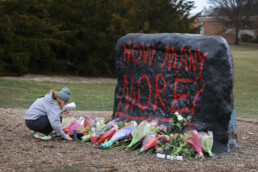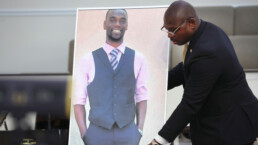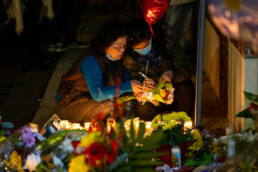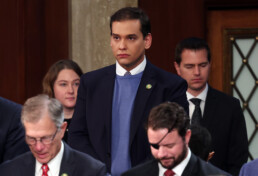This 21-year-old survived two school shootings
February 14, 2023NEWS,NEWSLETTER
|
Happy(?) Valentine's Day, Meteor readers, I wish I had better tidings for February 14, famously known as Anna Howard Shaw Day. But unfortunately, we must process the news of yet another tragic school shooting. In case you’re wondering, the last time we covered a mass shooting was…less than one month ago. Today we mourn the three lives lost, look into the shooter’s history, and explore the unprotected state of today’s transgender youth. I know, it’s a lot. I’ve been grabbing a feel-better snack about once every 28 seconds. My house is quickly running out of frozen Kit-Kats—which I highly recommend. Not exactly the Valentine's Day chocolates I was expecting, but I'll take it. Well, no putting it off any further. Let’s get into the news. Grabbing another pick-me-up, Bailey Wayne Hundl  WHAT'S GOING ONThe shooting at Michigan State: On Monday night, the eve of the fifth anniversary of the Parkland massacre, a tragic shooting took place at Michigan State University. Three people have died, five more were critically wounded, and the suspect has been identified as a 43-year-old man unaffiliated with the university, who ultimately shot and killed himself. The identities of two victims have been released: Brian Fraser, a sophomore who was president of MSU’s Phi Delta Theta chapter, and Alexandria Verner, a junior who played basketball, softball, and volleyball through high school. The family of the third victim has requested not to be identified.  THE ROCK, A MONUMENT ON THE MSU CAMPUS, PAINTED TO MOURN THE VICTIMS (Image by Scott Olsen, Getty Images News) The gunman’s history had many of the usual danger signs: He had been arrested in 2019 for carrying a firearm without a permit, and was sentenced to 18 months of probation—during which time his father has said he repeatedly lied to him about possessing a gun. At the time of last night’s shooting, the gunman had a two-page note in his backpack that indicated an additional threat to two schools in Ewing, New Jersey. (He apparently had ties in the area.) All Ewing public schools have been closed as a precaution. We know this story all too well. According to the Gun Violence Archive, this is the 67th mass shooting in America this year—and it’s only February. Mass shootings are so commonplace that we’re starting to see people whose lives are touched by more than one. This 21-year-old student, now a survivor of both the MSU shooting and the Sandy Hook shooting, summed it up best on TikTok last night: “We can no longer just provide love and prayers. It needs to be legislation. It needs to be action.” In a statement made today commemorating the Parkland massacre, President Biden announced that $231 million will be allocated to the Justice Department to “reduce gun violence and save lives.” This money will fund crisis intervention projects such as “red flag” programs. But of course, as we’ve discussed before, “red flag” laws are not enough; they require civilians to fire reports to trigger the law. If you recall from last fall, the gunman at Colorado Springs’ Club Q had been arrested before the shooting—but because he was not charged, and no one who knew him filed a report, he was allowed to keep his firearm. What’s needed instead is a full overhaul of our gun laws—starting with an assault weapons ban. Call your representatives today and tell them to act now to end gun violence. Who’s protecting trans youth?: On Monday, South Dakota Governor Kristi Noem signed HB 1080 into law, banning access to all gender-affirming healthcare for transgender minors. As of July 1, South Dakota doctors will be unable to prescribe or administer puberty blockers, hormone replacement therapy (HRT), or any gender-affirming surgery to anyone under the age of 18. This makes South Dakota the second state to outlaw this medical care, following Utah’s ban in late January. And with more than 80 similar bills on their way, more states are sure to join. This news comes as the trans community mourns the loss of Brianna Ghey, a 16-year-old trans teenager who was stabbed to death Saturday in a park in Warrington, England. (Two 15-year-olds have been arrested as suspects.) Police say they have not yet found evidence that this was a hate crime, but many of Ghey’s friends have come forward claiming she had faced transphobic bullying for years—with very little intervention or protection from the administration at her school. As a trans person who didn’t start HRT until I was late in my 20s, I have to wonder: Who do these anti-trans legislators think they’re protecting by blocking minors from accessing care? Because trans youth are not in any way protected right now. Anti-trans rhetoric makes them more vulnerable to attacks from their peers—not to mention the fact that trans youth who are blocked from gender-affirming care are far more likely to consider or attempt suicide. Legislators claim they’re just shielding young people from making irreversible changes to their bodies—but there’s no change more irreversible than death. As trans activist Lindsey Spero said while testifying before the Florida Board of Osteopathic Medicine on Friday, “Your denial of my need for this medication doesn’t make my existence as a trans person any less real.” As the Board considered a ban on puberty blockers and HRT, Spero used his allotted time to take a testosterone shot in front of them. He told the Board, “I could stand here and tell you about the times I attempted to end my life because I didn’t have access to gender-affirming care. But I know. I know you don’t care.” They still passed the ban, though. So I guess he was right. AND:
  FOLLOW THE METEOR Thank you for reading The Meteor! Got this from a friend? Sign up for your own copy, sent Tuesdays and Thursdays. Ideas? Feedback? Requests? Tell us what you think at [email protected]
|
![]()
The President's missed opportunity
February 9, 2023NEWS,NEWSLETTER
|
How’s it hanging, Meteor readers? Hope you’re all getting through the week and finding meaningful ways to relax. I took a two-hour bath yesterday and read Stephen King’s Misery. “But Bailey,” you might be thinking, “That’s not a very relaxing book.” And to that, dear reader, I say it is when you’ve had a week like mine. 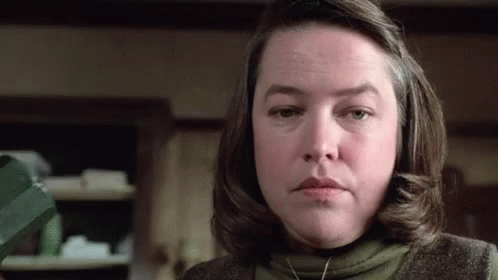 Today we look at President Biden’s State of the Union address: the highlights, the heckles, and the hole where a meaningful mention of abortion should have been. Plus, Barbra Streisand, Julia Louis-Dreyfus, and Rihanna all have something exciting to announce! HUGE day for women and women-admirers. But first: the cockadoodie news. Keepin’ it easy, Bailey Wayne Hundl  WHAT'S GOING ONThe state of our union: President Biden gave his second State of the Union address Tuesday night. Traditionally, the State of the Union is a speech given by one person, but I guess this one was a group performance? Republican hecklers were out in full force, including Marjorie Taylor Greene cosplaying as Effie Trinket from The Hunger Games. The odds were not in her favor, though: She yelled “liar!” at Biden for claiming some Republicans (“I’m not saying it’s a majority,” he specified) want to cut Medicare and Social Security; Biden took it in stride, responding he was glad to hear they’d changed their minds—considering many have indeed proposed to cut both. Remember when Rep. Joe Wilson yelled “You lie!” at President Obama (who also hadn’t) and it was treated like a big deal? That was fun. Makes you sort of nostalgic.  But all in all, Biden was able to face the stadium jeers and make several important points. He recounted the horror at Uvalde and called for Congress to “ban assault weapons now.” He honored the parents of Tyre Nichols, who were present, and stressed the importance of police reform. As Rep. Alexandria Ocasio-Cortez acknowledged on MSNBC, while advocates have said reform is not enough, POTUS has come a long way from just a year ago, when he was advocating more police funding. But we can’t help but acknowledge the elephant in the room (or perhaps, not in the room): abortion. As writer Jessica Valenti pointed out, the State of the Union “[had] four sentences on abortion. Four. By comparison, the speech [had] 19 sentences on ‘junk fees.’” He started by saying Congress needed to restore and codify Roe v. Wade. Well, okay. Yes. Ground-level stuff, but it’s worth saying. Then he claimed he’s doing everything he can, reassuring us, “If Congress passes a national abortion ban, I will veto it.” I mean…that’s great. But it’s not enough. Every day a new state is introducing or trying to introduce a new way to ban abortion. There is an imminent, very real threat to the abortion pill; the President could have brought awareness to it in a crucial week. He could have pointed out that denying abortions can kill pregnant people (especially considering that one of Dr. Jill Biden’s guests almost died as a result of Texas’ abortion ban). He could have given hope, given information, given a plan of action: anything. Half of America’s citizenry were stripped of their right to bodily autonomy overnight. Trans people have their bodily autonomy threatened more and more every day. Our bodies are under coordinated attack from state legislatures. And with the whole country watching, President Biden decided to offer four sentences of condolences and move on. Last fall’s election demonstrated how much we care about abortion; it’s not unreasonable that we ask our president to do the same. AND:

 FOLLOW THE METEOR Thank you for reading The Meteor! Got this from a friend? Sign up for your own copy, sent Tuesdays and Thursdays. Ideas? Feedback? Requests? Tell us what you think at [email protected]
|
![]()
The Case That Could Be Another Dobbs
A home for modern feminism
If this Texas lawsuit makes it to the Supreme Court, nationwide access to the abortion pill could be at risk.
BY SAMHITA MUKHOPADHYAY
February 7, 2023
If you’ve seen the headlines about a case in Texas that could make abortion pills illegal, you may have found them farfetched. How could a single judge in a single state determine the fate across the country of a medication that was approved by the FDA in 2000?
But those headlines are not an exaggeration: This is possible. And the radical right-wing hate group Alliance Defending Freedom is determined to make it happen. As the Washington Post reports, the Alliance, representing anti-abortion groups and doctors, filed a suit in November with the district court in Amarillo, Texas, where Trump-appointed Judge Matthew Kacsmaryk presides. The suit charges that the pills are unsafe, and FDA approval should be revoked. (It’s worth noting that the ADF has long advocated against LGBTQ rights and is also responsible for many of the anti-trans bills emerging around the country. The Southern Poverty Law Center classifies them as a hate group. Oh, and one of their senior counsel is Erin Morrow Hawley, wife of Rep. Josh “Abortion…is a violent act against the defenseless” Hawley.)
The Alliance knows that Amarillo is the place to try this—not just because Judge Kacsmaryk is presumably also anti-abortion, but because an appeal will land this case in the Trump-nominee-heavy 5th U.S. Circuit Court of Appeals. Given that court’s track record, there’s a good chance it would rule in the Alliance’s favor; another appeal after that would bring the case to the Supreme Court—the same court that overturned Roe v. Wade just last year.
The case could have immediate implications. If Judge Kacsmaryk does rule in favor of the anti-abortion plaintiffs—in a ruling that could come as early as next week—“it may block the availability of medication abortion nationwide…even in states where abortion is legal,” wrote Talcott Camp, chief legal and strategy officer of the National Abortion Federation, in a memo this week.
But the case is also a farce. As Dahlia Lithwick and Mark Joseph Stern write at Slate, its legal logic is non-existent. A plaintiff would have to prove they have personally been harmed by mifepristone—which is impossible as the Alliance is not representing patients. The suit also tries to claim that the FDA cut corners in the approval of mifepristone back in 2000. This is untrue: Not only was there testing at the time, but now, 23 years later, nearly half of abortions are medication abortions. Lithwick and Stern quote professors David Cohen, Greer Donley, and Rachel Rebouché from a yet-to-be-released paper on the abortion pill: “After more than twenty years on the U.S. market, mifepristone has become one of the most studied drugs available—many times safer than common drugs like penicillin or Viagra.”
In other words, a ruling in favor of the plaintiffs would be unprecedented and legally unsound, most legal critics (and the FDA) argue. That said, given the makeup of the courts at the current point in time on this here day in 2023—it’s actually possible.
So what, then? Even if the worst happens, it does not mean that medication abortion will disappear entirely. Mifepristone is one of two drugs in the most common abortion protocol (the other being misoprostol). As Dr. Jen Lincoln notes, you can still have a medication abortion using only misoprostol, although doing so runs the risk of more side effects. And you can still get mifepristone from international pharmacies (as through @AidAccessUSA). And if you can get your hands on the right meds, you can also self-manage medication abortions.
This case might feel small, but it is designed to be big. It clearly demonstrates the legal strategy of conservatives who are emboldened in the post-Trump era to restrict our bodily autonomy—whether we’re trans people or patients who need abortions.
The fight against that nonsense is going to be long. In the meantime, support your local abortion fund. Vote. Spread factual information. Take care of yourself and your communities.
27 Years After the Vagina Monologues
A home for modern feminism
The writer V—formerly Eve Ensler—on what’s changed for her and the world.
BY CINDI LEIVE
February 3, 2023
It’s been a quarter century since the performer Eve Ensler—who now goes by V—created the culture-changing play The Vagina Monologues and, shortly thereafter, the anti-violence organization V-Day. Times have changed—we now have more inclusive definitions of gender—but V’s gift as a writer has not. Her new book, Reckoning, touches on many topics but cuts deepest when it chronicles her decades-long recovery from childhood abuse.
Actually, let me restate because, after talking to V, I’m disinclined to use clichés: her decades-long recovery from her father raping her and her mother protecting him. And as you’ll hear, that specificity matters.
CL: You’ve been writing about violence for four decades. We’re more willing to have these discussions now. But how are you feeling about these issues in 2023?
V: We’ve had amazing victories. We’ve broken taboos. We’ve opened safe houses, we’ve changed laws, we’ve activated young people. A lot of wonderful things happened. But the essential problem is we have patriarchy. We can have one-off wins, but we’re still in that system where very, very, very few, usually men, have all the wealth, all the power, all the ability to determine who is valuable, who is worthy, who gets to live, who gets to die, who has money, who doesn’t, and that all the rest need to be controlled or gotten rid of. Are we going to stay like that? Or are we going to say—finally at last—we don’t accept this way of operating? Because otherwise we will be in this struggle for eternity.
Cindi Leive: One of the things that has always affected me about your writing—going back to when I first saw The Vagina Monologues in the mid-90s—is how specific you always are in your language. You write in Reckoning that “violence against women” has become too abstract and broad a term. What do you mean by that?
V: I’ve always been despondent over the terms that we keep using for violence against women. They just seem to get more and more distant, more and more abstract, as the violence seems to get more and more amplified and horrific. And I don’t think that’s accidental.
When we talk about “gender-based violence,” who’s doing the violence? What is exactly being done, and who’s it being done to? The confusion of that takes the responsibility off the perpetrator. It really should be “men committing violence against women.” I mean, not all violence against women is by men, but a great deal of it is. And when you say “rape,” it’s very different than when you say “gender-based violence.” One you have an image of, and can see. With “gender-based violence,” I have no vision of what that is.
In writing The Apology [V’s 2019 book in which she imagines her father apologizing to her], it was very clear to me that there is no apology without a rendering of the specific details of what you have done. Because in that specificity, both you—the victim—and the perpetrator know you were present at the same event. If you say “I’m sorry I abused you,” that’s not an indication that you were there. But if you say “I’m sorry I walked into your room that had the gingham sheets and the pink bedspread” then you both know you were in the same room, and you’re accountable to the same moment.
CL: In the book, speaking of your own experience, you write, “this abuse altered the constitutional makeup of my entire being. It filled my cells and blood and body with terror, worry, guilt, and dread—that would in my teenage years and on until my sixties develop into all-encompassing self-hatred and anxiety.” That’s a really devastating sentence. But it also made me a little bit hopeful because you say “until my sixties,” which implies that you have perhaps found some peace.
V: One of the things about the kind of violence that happens to women is that no one really wants to think about long-term consequences. We talk about it as if it’s a one-off event when in fact it radically alters a woman’s life forever, right? I don’t know any woman who was abused sexually as a child or a young woman who has not had huge intimacy issues, particularly if they were incested by a family member. Nobody talks about what it does to your memory or your ability to think or your willingness and ability to be a leader, because then you’re seen and then you become a target and then you could be raped again.
I’ve had to do a lot of work to escape, and by no means am I fully out of it. There are things that can trigger me and put me back into it. But since I wrote The Apology, I will say I’m in a very different place. I felt I was forever in my father’s story, and that has changed. Yes, I got very damaged and broken early on…but it’s not the sum of me, it’s not the total of me. And that’s amazing. I never thought that I would ever see that.
Why rape is not a "one-off" crime
|
Greetings, Meteor readers, Happy Black History Month! Last night, The Meteor welcomed an incredible group of performers to a packed house at New York City’s Joe’s Pub for Say The Word: A Night of Art and Action for Abortion. (If you were there, hi!) The show was jam-packed with brilliance: We heard from comedian Jaye McBride; Colombian human rights lawyer and abortion rights activist Paula Ávila-Guillén; and Pulitzer Prize and Tony Award-winning playwright Michael R. Jackson, who sang an original protest song. And then there was the glorious Dr. Kameelah Phillips, telling it like it is:  And as if that weren’t enough, Bob Odenkirk and David Cross reunited for the weirdest, most hilarious bit, all to raise money for the New York Abortion Access Fund. In today’s newsletter, the body-shaming of Sam Smith and the ridiculousness of the College board. Plus, Cindi Leive talks to writer V about what we get wrong about rape. But first, some news. LYLAS, Samhita Mukhopadhyay  WHAT'S GOING ONSam is thriving: The singer Sam Smith has a new video out for their single “I’m Not Here To Make Friends,” off the newly released album Gloria. In the video, Smith is serving looks—a giant fluffy pink dress and gloves, a feather get-up, and an amazing corset complete with nipple tassels. It’s queer, it’s flirty, it’s artistic; in other words, it’s a perfect music-video fit. But not everyone could get on board. Some boring people—in OpEds, on Twitter, on television—just had to criticize them for baring too much skin, claiming that the video was bad for children. Smith, however, told The Sunday Times that after years of feeling self-conscious about their body, they have learned to embrace themselves and “feel liberated, released from pressures I felt when I was young.” “I now have the opposite of body dysmorphia,” they said. “I look fabulous.” Your new mantra.  College Board catastrophe: The notoriously problematic College Board, which sets the curriculum for things like Advanced Placement classes and the SATs, has stripped down the curriculum of the African American Studies AP class, according to new reporting released yesterday. The New York Times reports that after vocal pressure from Florida Gov. Ron DeSantis, the new curriculum removed discussion on critical race theory, intersectionality, queer identity, Black feminism, and Black Lives Matter—along with work by Kimberlé Crenshaw and Ta-Nehisi Coates—but added “Black conservatism” as a possible area of study. Education reporter Dana Goldstein dug into exactly what was removed from the curriculum; the organization, meanwhile, said in a statement that it had made the changes before DeSantis’ public announcement. Meanwhile: the original class sounds awesome! Book club, anyone? AND:
 REP. ILHAN OMAR (IMAGE BY KENT NISHIMURA/LOS ANGELES TIMES VIA GETTY IMAGES)
  THE METEOR INTERVIEW27 Years After the Vagina MonologuesThe writer V—formerly Eve Ensler—on what’s changed for her and the world. BY CINDI LEIVE  V (FORMERLY EVE ENSLER) (IMAGE BY BRYAN BEDDER VIA GETTY IMAGES) It’s been a quarter century since the performer Eve Ensler—who now goes by V—created the culture-changing play The Vagina Monologues and, shortly thereafter, the anti-violence organization V-Day. Times have changed—we now have more inclusive definitions of gender—but V’s gift as a writer has not. Her new book, Reckoning, touches on many topics but cuts deepest when it chronicles her decades-long recovery from childhood abuse. Actually, let me restate because, after talking to V, I'm disinclined to use clichés: her decades-long recovery from her father raping her and her mother protecting him. And as you’ll hear, that specificity matters. Cindi Leive: You've been writing about violence for four decades. How are you feeling about these issues in 2023? V: We’ve had amazing victories. We’ve broken taboos. We’ve opened safe houses, we’ve changed laws, we’ve activated young people. A lot of wonderful things happened. But the essential problem is we still have patriarchy. We can have one-off wins, but we’re still in that system where very, very, very few people, usually men, have all the wealth, all the power, all the ability to determine who is valuable, who is worthy, who gets to live, who gets to die, who has money, who doesn’t, and that all the rest need to be controlled or gotten rid of. Are we going to stay like that? Or are we going to say—finally, at last—we don’t accept this way of operating? Because otherwise, we will be in this struggle for eternity. CL: One of the things that has always affected me about your writing—going back to when I first saw The Vagina Monologues in the mid-90s—is how specific you always are in your language. You write in Reckoning that “violence against women” has become too abstract and broad a term. What do you mean by that? V: I've always been despondent over the terms that we keep using for violence against women. They just seem to get more and more distant, more and more abstract, as the violence seems to get more and more amplified and horrific. And I don’t think that’s accidental. When we talk about “gender-based violence,” who’s doing the violence? What is exactly being done, and who's it being done to? The confusion of that takes the responsibility off the perpetrator. It really should be “men committing violence against women.” I mean, not all violence against women is by men, but a great deal of it is. And when you say “rape,” it's very different than when you say “gender-based violence.” One you have an image of and can see. With “gender-based violence,” I have no vision of what that is. In writing The Apology [V’s 2019 book in which she imagines her father apologizing to her], it was very clear to me that there is no apology without a rendering of the specific details of what you have done. Because in that specificity, both you—the victim—and the perpetrator know you were present at the same event. If you say, “I’m sorry I abused you,” that’s not an indication that you were there. But if you say, “I'm sorry I walked into your room that had the gingham sheets and the pink bedspread...” then you both know you were in the same room, and you’re accountable to the same moment. CL: In the book, speaking of your own experience, you write, “this abuse altered the constitutional makeup of my entire being. It filled my cells and blood and body with terror, worry, guilt, and dread—that would in my teenage years and on until my sixties develop into all-encompassing self-hatred and anxiety.” That's a really devastating sentence. But it also made me a little bit hopeful because you say “until my sixties,” which implies that you have perhaps found some peace. V: One of the things about the kind of violence that happens to women is that no one really wants to think about long-term consequences. We talk about it as if it's a one-off event when in fact, it radically alters a woman's life forever, right? I don't know any woman who was abused sexually as a child or a young woman who has not had huge intimacy issues, particularly if they were incested by a family member. Nobody talks about what it does to your memory or your ability to think or your willingness and ability to be a leader because then you’re seen, and then you become a target, and then you could be raped again. I’ve had to do a lot of work to escape, and by no means am I fully out of it. There are things that can trigger me and put me back into it. But since I wrote The Apology, I will say I’m in a very different place. I felt I was forever in my father’s story, and that has changed. Yes, I got very damaged and broken early on…but it’s not the sum of me, it’s not the total of me. And that's amazing. I never thought that I would ever see that.  FOLLOW THE METEOR Thank you for reading The Meteor! Got this from a friend? Sign up for your own copy, sent Tuesdays and Thursdays. Ideas? Feedback? Requests? Tell us what you think at [email protected]
|
![]()
Why it doesn't matter when cops are Black
|
Dear Meteor readers, Hey there! Samhita here–filling in for Shannon. (She thanks you for the love many of you sent her way as she left for her maternity leave). Though January can feel endless thanks to post-holiday letdown, I broke mine up by heading to the Sundance Film Festival to check out the feminist film offerings (and catch a glimpse of Jason Momoa, nothing un-feminist about that, right?).  This year's festival boasted many explicitly feminist films—several of which I got to see, including Going To Mars: The Nikki Giovanni Project, directed by Joe Brewster and Michèle Stephenson (which won the Sundance award for Best Documentary) about the life of the great Black, lesbian poet Nikki Giovanni; and Invisible Beauty, a touching and personal portrait of one of the first Black supermodels, Bethann Hardison, directed by Frédéric Tcheng and Hardison herself. (At the screening for that one, there was a standing ovation and not a dry eye in the house as Hardison addressed the crowd.) Significantly, I also got a chance to see two major political docs. Tracy Droz Tragos’ Plan C is a painful-to-watch deep dive into the networks of women getting pregnant people access to the abortion pill in this changing, dangerous legal landscape. And Nancy Schwartzman’s newest documentary, Victim/Suspect, showcases women who were sexually assaulted but had police question their stories or manipulate them into recanting—only then to arrest and charge them with filing false reports. (She’s a pro at this tough material: Last fall, we talked to her about her documentary and book regarding the Steubenville rape.) Amid all of that, I moderated two panels: One, where I talked to filmmakers Justin Chon, Liz Sargent, and Sing J. Lee about what an AAPI story looks like in 2023; and another, in conversation with actress Anaita Wali Zada, who plays an Afghani refugee in the surreal and heartbreaking film Fremont. (Zada herself had to flee Afghanistan, targeted by the Taliban for her work as a journalist.) In other words: There are a lot of excellent and important stories out there; may they all find buyers and make their way to your screens. In today's newsletter, we look at why it didn't matter that the police who killed Tyre Nichols are Black, new allegations against Marilyn Manson, and the wonderful little development of emergency contraception vending machines on college campuses. Xo, Samhita Mukhopadhyay
 WHAT'S GOING ON A PHOTO OF TYRE NICHOLS FROM A PRESS CONFERENCE ON JAN. 27. (IMAGE BY SCOTT OLSON VIA GETTY IMAGES) What we know about another horrific police killing: Last week, video was released of the five Memphis police officers who severely beat Tyre Nichols during a traffic stop on Jan. 7; he died three days later. In the body cam footage of the attack, you can hear, among other things, Nichols call for his mother, who was only 100 yards away. He was reportedly a shy young man who loved skateboarding and photographing sunsets, as well as a father to a 4-year-old son. As you may have read, the officers involved in the beating of Nichols were part of a unit known as SCORPION—a "special" unit that targets neighborhoods deemed particularly high in crime by the Memphis Police Department. (The unit has now been disbanded). Five of the officers involved in the beating—all of whom were Black—were subsequently arrested and charged with second-degree murder. Another white officer, who was also on the scene and allegedly tased Nichols, was discharged from the force. So naturally, one of the topics of much discussion since the murder has been how much, and whether, it matters that the murderers were Black. Nichols' mother told the Washington Post that that fact makes the news of her son's untimely death "even harder to swallow...[T]hey are Black and they know what we have to go through," she said.  ROWVAUGHN WELLS, MOTHER OF TYRE NICHOLS AT A PRESS CONFERENCE ON JAN. 27. (IMAGE BY SCOTT OLSON VIA GETTY IMAGES) But for many observers, the race of the perpetrators was not surprising at all. While police departments often tout hiring more Black officers as a strategy to solve police violence, journalist Wesley Lowery has studied police aggression and found that the race of the cop doesn't really make a difference in whether an encounter with a suspect gets violent. As he wrote on Twitter, "this also applies to the narrative focus on 'white' officers in cases like Ferguson, Walter Scott, etc etc. What this implies—often unintentionally—is that the issue here is personal (or personal prejudice) and not systemic (something any officer could get caught up in)." And systemic reforms need to go further, argues abolition scholar Derecka Purnell. She pointed out in The Guardian that many of the reforms touted to decrease police violence were in place in the Nichols case: Not only were the officers Black (as is 58% of MPD’s 2000-person police force), but they also had body cameras. She notes that the MPD claims to have met all the criteria in Campaign Zero’s #8CantWait—a campaign to decrease the use of excessive force by police—and also has a Black woman as the police chief. Her conclusion? Not that change is impossible—but that you can only achieve it by steps to decarceration that “reduce the role and power of policing, rather than simply changing the colors of the people committing the harm.” AND:
  FOLLOW THE METEOR Thank you for reading The Meteor! Got this from a friend? Sign up for your own copy, sent Tuesdays and Thursdays. Ideas? Feedback? Requests? Tell us what you think at [email protected]
|
![]()
What Does the Brett Kavanaugh Documentary Do For Us?
January 26, 2023NEWS,NEWSLETTER
|
Buona sera Meteor readers, This send is somewhat bittersweet. Sweet because it’s, as usual, chock full of interesting stories you may or may not have heard about, like the new slate of anti-LGBTQ bills in Indiana, the latest on Brittney Griner, and a look at the Brett Kavanaugh documentary Justice which premiered at Sundance last week. But it’s bitter because it is also the last newsletter I’ll be writing for quite some time—because I am having a baby 🐣. It’s been an absolute joy and privilege to be a part of all 105 Meteor newsletters so far (who’s counting, me, I’m counting). We’ve written through fun times and through absolute horror, and with each send our community has grown, and so have I. But, alas, it’s time for me to prep for my biggest project of all: parenthood. My firstborn is due to arrive soon and while I’d love to hang out here with all of you, my fingers have swollen to the size of stuffed Vienna sausages, and it’s time to hand the keyboard over to someone else for a bit. So I really hope you enjoy this one. My daughter and I will see you all on the other side.  Marie Kondo-ing my baby’s drawers, Shannon Melero  WHAT'S GOING ON“Slate of hate”: Indiana is imitating Florida with a new batch of bills aimed at making the lives of school-aged LGBTQ children absolutely miserable. In total, there are three bills, including one in the Indiana House and one in its Senate, which both move to outlaw the mention of “gender fluidity; gender roles; gender stereotypes; gender identity; gender expression; or sexual orientation,” in grades K-12 in the classroom, among other things. And while these bills are frightening and intrusive—and would, by the way, keep all children from learning about gender—the third bill manages to one-up them both: LGBTQ news outlet them reports that SB 354 would “require schools to notify parents if a student ‘has conflicted feelings’ about gender identity, or if they change their name, attire, or pronoun ‘in a manner that is inconsistent with the student’s biological sex at birth’.” Let’s call this what it is: mandatory outing. Indiana lawmakers think it’s a good idea for teachers to start outing kids to their parents—without any knowledge of how those parents will react. And to what end, other than to put students at risk? I’m seriously asking. Class is canceled: Yesterday, students walked out of John Comaroff’s class at Harvard due to the school’s handling of Comaroff’s alleged sexual misconduct. (He had been accused of groping and harassing three graduate students last year.) One student read from a statement that said, in part, “We don’t want to be taught by someone who has still not been held accountable for or made amends for their sexual misconduct. If you agree, please join us in walking out of this classroom.” (At least 100 people did.) According to the Harvard Crimson, Comaroff was placed on leave last year after violating the university’s sexual harassment policy. (An internal investigation found that the accusations made against him were plausible, but no criminal charges were brought, and he is still tenured at Harvard.) For Harvard alum and our Meteor colleague Tara Abrahams, this was simply history repeating itself. Exactly 25 years ago this spring, Abrahams, then a junior at the school, wrote in Harvard Magazine about a similar situation in which “Harvard had not explicitly condemned sexual harassment and inappropriate conduct through real action, but had privately admonished a guilty faculty member.” After seeing all of those students take a stand against Comaroff and the institution’s decision to allow him to keep teaching, Abrahams told me, “I wish that the bravery of the students I spoke to more than 20 years ago had counted for more, that their speaking out would have meant that these young people would be able to experience a different Harvard today…And maybe I even feel a tiny glimmer of hope—that because of these kids standing up, one day, enough really will be enough.” AND:

 THE METEOR AT SUNDANCEDoes Justice Serve Justice? BOSS BABY BIG MAD! (IMAGE BY WIN McNAMEE VIA GETTY IMAGES) This past weekend, at the Sundance film festival, I caught the surprise feature Justice—a documentary about the allegations which surfaced against Brett Kavanaugh before his Supreme Court confirmation. The movie picks up where the botched FBI investigation ended—you know, the one that reportedly generated 4500 tips that the Trump White House ignored. The film doesn’t reveal anything particularly new—but it will absolutely resurface your rage. Justice does add context to what we already know, especially through a rigorous deep dive into fellow Yale student Deborah Ramirez’s allegations that Kavanaugh exposed himself to her at a party while they were undergraduates. According to the documentary, the FBI talked to Ramirez when they re-opened the investigation after Dr. Christine Blasey Ford’s testimony, but allegedly failed to follow up with any of the witnesses Ramirez’s team provided. Instead, they turned her testimony over to the Senate Judiciary Committee but Ramirez was never called to testify. The most damning bit of the movie is audio of Max Stier, one of Kavanaugh’s classmates at Yale and now the CEO of the nonpartisan DC group Partnership for Public Service. In the recording, which Stier allegedly submitted to the FBI in the days after Dr. Ford’s testimony as well, he both corroborates Ramirez’s account of what happened and describes another incident he witnessed. In the audio, Stier says that he was in a room where Kavanaugh was drunk and had his pants down, with a group of fellow students trying to force a young woman to touch his penis. As journalists Robin Pogrebin and Kate Kelly reported in their 2019 book, The Education of Brett Kavanaugh: An Investigation, the FBI did not follow up on Stier’s allegations. Kavanaugh was confirmed without the public hearing them. But hearing them out loud now is gutting. Stier himself did not speak to the filmmakers, and similarly, the movie is haunted by the absence of Dr. Ford, who is seen briefly at the beginning, and in clips throughout. (Director Doug Liman says it’s because she’s given enough to the country already; no argument there. As she told the Meteor in 2021, the months and years since the hearings have been brutal.) The movie is a stark portrait of one of the darkest moments in the history of American democracy, and it’s hard not to walk out retriggered, especially with the four years we’ve experienced since Dr. Ford’s gutting testimony. But in 2023, anger doesn’t feel like enough. Justice doesn’t get us much closer to accountability for the survivors—or change the reality that a sitting Supreme Court justice most likely perjured himself. Hopefully, this documentary is the beginning of a process—not just of rage but of actual, what’s the word, justice. But that’s unlikely. -Samhita Mukhopdhyay  FOLLOW THE METEOR Thank you for reading The Meteor! Got this from a friend? Sign up for your own copy, sent Tuesdays and Thursdays. Ideas? Feedback? Requests? Tell us what you think at [email protected]
|
![]()
Is This Normal?
January 24, 2023NEWS,NEWSLETTER
|
Good evening Meteor readers, Last night, along with a million other folks across the country, I settled into the couch for three hours of appointment television. Yes, I’m talking about the 30th anniversary of Monday Night RAW, the longest-running weekly episodic television show in American history. Oh, were you watching something else? The evening was a celebration of not just the longevity of the show itself—which, for the uninitiated, is the premiere weekly wrestling program in the U.S —but of its iconic characters, some inexplicably still active in the wrestling world: Triple H, the Undertaker, Sean Michaels, etc. (I’d love to tack a woman onto that list, but alas, it seems that some invites got lost in the mail. Honorable mention to Alundra Blayze who was on screen for 15 seconds.)  TRISH STRATUS WATCHING THE SHOW FROM HOME AND SEEING NOT A SINGLE LEGENDARY WOMAN IN ATTENDANCE. As a lifelong on-and-off wrestling fan (the early-Divas era was hard for some of us), all that nostalgia made me reflect on how much and how little can change in 30 years. Since its inception, RAW has gone from a kitschy, wildly sexist male-driven soap opera to a multi-million dollar enterprise that can sometimes recognize its own sexism and even address it. Meanwhile, some institutions seem to make no progress at all. And as the headlines reminded us this weekend, over the last 30 years, America has managed, slowly but surely, to normalize the occurrence of mass shootings. A different day, a different set of victims, and the same response: thoughts, prayers, “never agains,” empty political gestures. Rinse, repeat. Without a breather. In today’s newsletter, we attempt to make sense of another tragedy and search for a few bright spots in the world. Surreptitiously convincing you to watch wrestling, Shannon Melero  WHAT'S GOING ONA weekend of mass shootings: There have been 39 mass shootings in the month of January, and the one that took place in California yesterday afternoon is the second the state has seen in three days. Before that shooting in Half Moon Bay, where seven were killed and one left in critical condition, there was the shooting in Monterey Park, which claimed 11 lives. And then, on Monday night, there was another shooting in Oakland, with one killed and seven injured. As one assemblyman in California told the Washington Post, “Before we’ve even had a chance to mourn them, there is yet another mass shooting.” The weight of that statement is bone-crushing. Police still have not determined a motive for either the Monterey Park or Half Moon Bay shootings, the former of which took place while the local community was celebrating the Lunar New Year. The suspected Monterey gunman reportedly died from a self-inflicted gunshot shortly after the incident. Meanwhile, the Half Moon Bay shooter was taken into police custody after he was found parked outside a precinct. No one has been apprehended in connection to the Oakland shooting. In response to this horrific string of events, President Biden called on Congress to reinstate the assault weapons ban, which you may recall expired in 2004. But we’ve seen this song and dance before, and the legislative process required to end (or even put a dent in) gun violence would require massive changes, like Republicans unclasping the death grasp they have on the second amendment. Ironically this brings to mind part of a motivational speech from Peloton instructor Jess Sims where she notes that people sometimes confuse the word hard with the word impossible. Solving gun violence is not impossible; it’s just extremely fucking hard. But hard things get accomplished all the time. *Looks at every other country on the globe that doesn’t have this problem* If you or someone you know has been impacted by gun violence and is looking for help, please start here. If you are a member of the AAPI community and are looking for mental health resources, try here. And if you’d like to take part in ending gun violence, here are some suggestions from the Prevention Institute. “Nothing to celebrate”: Renee Chelian was 15 years old when she found out she was pregnant. Although it was illegal at the time—1966—her parents asked her if she wanted to have an abortion. She said yes. Chelian is now an abortion provider in her home state of Michigan, and because of that initial traumatic experience, she has helped thousands of patients receive safe abortion care. On what should have been the 50th anniversary of Roe v. Wade, Chelian felt there was “nothing to celebrate.” But we celebrate her and the heroes, known and unknown, who work against all odds to provide necessary healthcare to pregnant people. AND:

 METEOR IRLHave you gotten your tickets for our live event yet? No? It's next week!! Click the image below to get the goods.  FOLLOW THE METEOR Thank you for reading The Meteor! Got this from a friend? Sign up for your own copy, sent Tuesdays and Thursdays. Ideas? Feedback? Requests? Tell us what you think at [email protected]
|
![]()
Literally, Who Is George Santos?
January 19, 2023NEWS,NEWSLETTER
|
Blessed eve to you, Meteor readers, Today I’m thinking about New Zealand Prime Minister Jacinda Ardern, who announced that she would resign before her country’s next election. And she’s not doing it because of scandal or because she thinks she can’t win another election. (Shit, I’d vote for her if I could.) She’s doing it because, as she said, there just isn’t enough in her tank to do the job to the level of excellence she’s previously provided.  This really struck me. I’m so accustomed to American culture, where you work and do a job until it absolutely hobbles you, and then, in your depleted state, you do a little more. Imagine being so in tune with yourself and caring for your country so much that you can put your ego to the side and make a selfless decision like that. The zipping sound you hear is my suitcase closing as I head to catch a flight to NZ to ask Jacinda Ardern to be my new mentor. But before I board, we’ve got a great newsletter for you today with a look into the many lived lives of George Santos and a special announcement waiting for you down unda’. Evaluating all tank levels, Shannon Melero  WHAT'S GOING ONGeorgie boy: Where do we even begin? If you haven’t been following the walking VEEP episode that is the George Santos saga, bottom line is that this New Yorker’s election win helped Republicans cinch a narrow lead in the House last November. Santos’s campaign had been built on a litany of inspiring, heartwarming stories that were almost too good to be true. And as it turns out—they weren’t. As he tells it, Santos’ parents were both immigrants: his father from Brazil, his mother from Europe, where she “fled socialism.” (I really didn’t want to interrupt myself so early, but FYI, they’re both from Brazil.) He says they enrolled him in Horace Mann Prep, but tragically, they couldn’t afford to keep him enrolled; he had to drop out four months before graduation. (Sorry to interrupt again, but as a representative from Horace Mann told CNN, “There is no evidence that George Santos (or any alias) attended.”) Speaking of his mother: According to Santos, the September 11 attacks claimed her life. Wait, no, sorry. She died in 2016, also according to him. But she was, he claims, in her office in the South Tower when the plane hit…which is a bit odd, considering her official immigration documents place her in Brazil at that time. Is now a bad time to bring up his claims that his grandmother was a victim of the Holocaust? (She wasn’t.) But enough talk about the distant past. Let’s discuss something more recent! In 2016, he raised $3,000 through GoFundMe to remove a life-threatening tumor from the dog of a disabled veteran. So sweet—or at least it would have been if he hadn’t kept the money for himself. Honestly, I could go on. He may or may not have a husband. He may or may not have stolen his roommate’s scarf to wear to a Trump rally. He may or may not have once been a drag queen (which, for some reason, is one of the only stories that he’s addressed). There’s a lot of uncertainty when it comes to Santos, but one thing is clear: The Republicans made a desperate mistake relying on him for their majority, just another in a long line of frantic clings to power with no thought for what it might mean for our country. But surely a politician with this many blatant, bald-faced lies can’t maintain his position for long…Right? AND:

—Bailey Wayne Hundl  METEOR IRL FOLLOW THE METEOR Thank you for reading The Meteor! Got this from a friend? Sign up for your own copy, sent Tuesdays and Thursdays. Ideas? Feedback? Requests? Tell us what you think at [email protected]
|
![]()
Don't Stop Posting About Iran
|
Salutations, Meteor readers, It’s our least favorite day of the week: Monduesday, the Tuesday after a 3-day weekend. Yes, it’s a word, and I’m determined to make it happen. But as always, it is good to be in your inbox once again bringing you something special. Last week, we wrote about the ongoing execution of protestors in Iran. One question we had not seen addressed: In a revolution sparked and led by women, why is the Iranian regime choosing primarily to sentence men to death? We asked Sherry Hakimi, policy advisor and executive director of genEquality, to help us better understand what’s going on. But before that, a little news. With love, Shannon Melero  WHAT'S GOING ONLeading Against White Supremacy: Texas representative Sheila Jackson Lee introduced a bill last week, H.R 61, that seeks to “prevent and prosecute white supremacy-inspired hate crime” as well as expand the scope of what is considered a hate crime to begin with Seems reasonable! And yet Republicans immediately framed this bill as an attack on the First Amendment. Lauren Boebert literally called it a mockery. Here’s why that doesn’t make sense: First of all, according to the FBI, there were over 4000 racially motivated crimes reported in 2021—so the suggestion that something be done about them isn’t coming out of left field. Second, Lee’s bill doesn’t suggest an overhaul of how free speech works, it simply looks to include specific language into existing laws surrounding hate speech that would criminalize conspiracy to commit a white supremacist hate crime, meaning even if you personally don’t do a hate crime but you post something that inspires one, you can still be held culpable for the crime. We should be calling this the name-the-devil-for-what-he-is bill. Still a little confused? Don’t worry, so was Boebert. This bill would not send your Uncle Rob to jail because he posted a racist-lite meme on his Facebook page. But it would give the government clearance to investigate your little cousin Rich who has been consistently posting about how much he hates the mosque down the street on a Reddit sub-thread about white nationalism and replacement theory. See the difference? Yes, it’s 2023: ICYMI, last week Missouri’s House of Representatives used their limited time on earth to update their dress code—but only for women lawmakers, who are not allowed to wear anything sleeveless. And before you check to see if that last link goes to The Onion, this REALLY happened. The updated rule states that the “proper attire for women” consists of trousers, skirts, or dresses worn with jackets and blazers. Cardigans are also acceptable for the fashion girlies. The debate over this rule (yes, a serious debate between adults) ranged between what qualifies as a jacket or blazer, whether or not knit blazers were acceptable, and if certain fabrics would disqualify said jackets and blazers. As Missouri state Rep. Ashley Aude told CNN, “On day one in our legislature, they’re doubling down on controlling women.” (Friendly reminder that it’s always a good day to run for office.) AND:
 FOUR QUESTIONSWhat We All Need to Know About the Executions In Iran“This is androcide.” BY SHANNON MELERO  PROTESTORS IN ITALY DISPLAY AN IMAGE OF ONE OF THE MEN EXECUTED BY THE IRANIAN REGIME. (IMAGE BY STEFANO MONTESI VIA GETTY IMAGES) Just three days ago, Iranian news agencies confirmed the execution of another man. As far as reliable sources are able to confirm, he appears to be the 33rd person executed by the state in 2023. As the regime continues to crack down on protestors who have taken to the streets after the death of Mahsa Amini, I spoke to Sherry Hakimi, policy advisor and executive director of genEquality about what’s really happening—and what, if anything, we can do. Shannon Melero: What exactly does the international community need to know about the executions of protestors happening in Iran? Sherry Hakimi: The Islamic Republic has long used execution as a violent tactic for suppressing dissent. Even before the recent revolutionary movement, executions had been rising in Iran: In 2022, the number reportedly surpassed 400 before the September protests began; in 2021, there was a 20% increase in executions over 2020, mostly on drug-related offenses. According to the Office of the United Nations High Commissioner for Human Rights, these executions break international human rights law by violating due process and fair trial guarantees. The violations include the use of vaguely worded criminal provisions, denial of…the right to present a defense, forced confessions obtained through torture and ill-treatment, failure to respect the presumption of innocence, and denial of the right to appeal. What are these people being charged with that is so severe their government believes it warrants death? To be clear, these are charges made in sham judicial processes. Currently, the common charges are murder of [Iranian Revolutionary Guard Corps officers], “moharebeh” (“waging war against God”), and “mofsed-e-felarz” (“corruption on earth”). The people who have been executed to date have been found guilty of murder on the basis of what can only be called coerced confessions. As for “moharebeh” and “mofsed-e-felarz,” these are catch-all charges that the Islamic Republic often levies on anyone who goes against them. It’s important to recognize that from whatever angle you look at it—judicial, political, social, moral—these executions are illegitimate and must be stopped. Is there a reason that the executions we’re aware of have been men? I think in general we understand that this revolution began with and about women, and yet that’s not who we are seeing receive these harsh punishments. First, I have to disagree with the implication that women aren’t receiving harsh punishments. There are reportedly more than 19,000 people currently held in Iran’s jails, and there have been numerous reports of Iranian women being brutally beaten, tortured, raped, disfigured, and murdered by regime forces. Going through a sham judicial process before being brutalized or murdered does not lessen the harshness of either. The atrocities experienced by women—namely, brutal rape and sexual assault—are violent, gruesome atrocities that will haunt and adversely affect those women for the rest of their days, leaving them psychologically, emotionally, and often physically scarred. I am in no way diminishing the severity of execution, but rather, elevating the severity of rape and sexual assault to the level at which it should be considered. Both execution and rape are unacceptable and inhumane tools of war utilized by primitive brutes. These acts have no place in today’s world. A few points come to mind as to why we’re seeing more men face execution. First, there’s very little (if any) reason to believe a single one of the charges levied against any detained protester, but the four men who have been executed to date were all charged with murder. It’s possible that the Islamic Republic, in keeping with its patriarchal ways, thinks it is somewhat more plausible to pin false murder charges against male protesters. Second, although Iran is one of the world’s biggest perpetrators of the death penalty (second only to China) [with] the distinction of having executed the most women to date, women generally make up a small percentage of the people who are executed each year everywhere. (According to the Death Penalty Information Center, women make up 1.2% of the people who have been executed since 1976 in the U.S.) It’s possible that we’re seeing a similar dynamic play out in Iran. All protesters and detainees face brutal and indiscriminate beating and torture. Women disproportionately experience brutal assault and rape, and men disproportionately are handed execution sentences.  PROTESTORS TOOK TO THE STREETS OF ISTANBUL EARLIER THIS MONTH TO TAKE A STAND AGAINST THE REGIME'S EXECUTIONS. (IMAGE BY OMER KUSCU VIA GETTY IMAGES) Third, this is indeed a female-led revolution, but the protesters are not solely women. From the beginning, we have lauded the fact that Iranian men and boys have been out there, shoulder to shoulder, protesting alongside Iranian women and girls. Lastly, it’s likely not an accident that the four men executed to date and the dozens of others who face imminent execution include a karate champion, a bodybuilder, a doctor, a popular rapper, etc. In instances of war and conflict, both international and domestic, there is a history of aggressors targeting strong, skilled men and boys. This is androcide: when one side of a conflict sees its opposing men, fighting or otherwise, as rivals and a threat to their superiority and thus sets out to kill the rivals and neutralize the perceived threat. Frankly, only a country led by weak and insecure brutes treats its own people as the enemy and wantonly subjects them to violence and death. Is there anything people outside of Iran can do to help? Is there something specific the American government should be doing? This revolutionary movement is ongoing, and the plea of Iranian protesters is for everyone outside of Iran to be their voice. To that end, one of the most helpful things that people can do is to keep posting about Iran across their social media channels. This is the rare case in which posting about an issue on social media is not “slacktivism,” but rather, proper activism. You can also join protests, speak with friends about what’s going on in Iran, and generally use every opportunity to spread awareness of the Iranian people’s fight for women, life, and freedom. Revolutions are unpredictable, but the Islamic Republic regime is unlikely to fall quickly. To that end, both the U.S. and the international community need to have short-term and long-term plans. Short-term actions include announcing targeted sanctions on Islamic Republic leaders, appropriately reducing the Islamic Republic’s legitimacy in multilateral institutions like the UN, and increasing civic technology access; long-term actions include mobilizing needed humanitarian aid, emergency medical services, and greater international accountability mechanisms. One thing that we really haven’t been talking about—but we should—is that as Iranian protesters are being brutalized, there are lives, limbs, eyes, and more being needlessly lost due to a lack of medical care. I believe that international leaders (by “international leaders,” I mean every country in the world, as well as the United Nations, World Health Organization, Red Crescent, Doctors Without Borders, and the like) need to think harder and more innovatively about what aid and support they are providing to Iranian protesters. Getting emergency medical services into Iran will be a challenging task, but it is still an effort that should be made, preferably as noisily as possible. I would really like to see more people calling on the various humanitarian/health organizations to step up efforts to help Iranians who are fighting for freedom.  Shannon Melero is a Bronx-born writer on a mission to establish borough supremacy. She covers pop culture, religion, and sports as one of feminism's final frontiers.  FOLLOW THE METEOR Thank you for reading The Meteor! Got this from a friend? Sign up for your own copy, sent Wednesdays and Saturdays.
|
![]()
